

Errant road users, for instance, those who violate traffic laws, can hinder road safety and cause detrimental situations to occur, not only to themselves but to other road users as well. Therefore, the Singapore Traffic Police could promote road safety through the use of reinforcements and punishments to help create a safer road for all users. What is Operant Conditioning? (Watch from 5:44mins on Operant Conditioning) How to Train a Brain - Crash Course Psychology #11. Operant Conditioning Explained. What is Operant Conditioning? Reinforcement and Punishment. Figure 1: Operant Conditioning. Illustration of Figure 1. Skinner’s Operant Conditioning: Rewards & Punishments. Operant conditioning: Positive-and-negative reinforcement and punishment.
Reinforcement. What Is Reinforcement in Operant Conditioning? One of the many different ways in which people can learn is through a process known as operant conditioning (also known as instrumental conditioning).1 This involves learning through reinforcement or punishment.
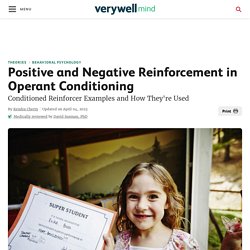
The type of reinforcement used can play an important role in how quickly a behavior is learned and the overall strength of the resulting response. Understanding Reinforcement Reinforcement is a term used in operant conditioning to refer to anything that increases the likelihood that a response will occur. Psychologist B.F. Skinner is considered the father of this theory. For example, reinforcement might involve presenting praise (the reinforcer) immediately after a child puts away her toys (the response). Reinforcement can include anything that strengthens or increases a behavior, including specific tangible rewards, events, and situations. Primary and Secondary Reinforcement. Positive vs Negative Reinforcement in ONE Minute. Schedules of Reinforcements.
Operant Conditioning Schedule of Reinforcement Explained! Schedules of Reinforcement In Applied Behavior Analysis (ABA) Punishment. The Study of Punishment in Psychology. Punishment is a term used in operant conditioning to refer to any change that occurs after a behavior that reduces the likelihood that that behavior will occur again in the future.
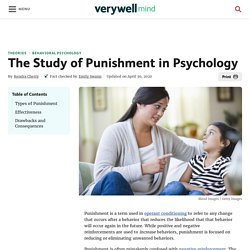
While positive and negative reinforcements are used to increase behaviors, punishment is focused on reducing or eliminating unwanted behaviors. Punishment is often mistakenly confused with negative reinforcement. The difference: Reinforcement increases the chances that a behavior will occur and punishment decreases the chances that a behavior will occur. Types of Punishment Behaviorist B. Positive punishment: This type of punishment is also known as "punishment by application. " Effectiveness. Positive and negative punishment. Positive Reinforcement.
DirectAsia.com Safer Roads Campaign 2015. In conjunction with the final day of the Home Team Festival 2015, the Traffic Police (TP) and the Singapore Road Safety Council (SRSC) held the DirectAsia.com Safer Roads Campaign 2015 today.
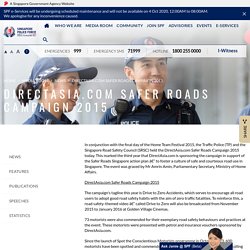
This marked the third year that DirectAsia.com is sponsoring the campaign in support of the Safer Roads Singapore action plan – to foster a culture of safe and courteous road use in Singapore. The event was graced by Mr Amrin Amin, Parliamentary Secretary, Ministry of Home Affairs. DirectAsia.com Safer Roads Campaign 2015. Singapore Traffic Police - Reward the Riders Program. Positive Reinforcement - Certificate of Merit (COM) Certificate of Merit. What is it? And how can you get one? Getting a driver’s licence ensures that you are qualified to drive.
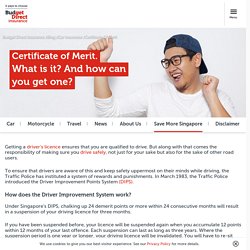
But along with that comes the responsibility of making sure you drive safely, not just for your sake but also for the sake of other road users. To ensure that drivers are aware of this and keep safety uppermost on their minds while driving, the Traffic Police has instituted a system of rewards and punishments. Negative Reinforcement. Safe Driving Course - A Negative Reinforcement. SINGAPORE — Motorists who have accumulated more than half of their maximum allowable demerit points now have a chance to redeem themselves via the Traffic Police’s Safe Driving Course (SDC), set to be introduced next month.
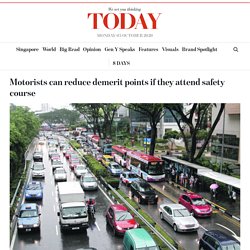
Designed to educate motorists on safe driving techniques, correct dangerous driving behaviour and encourage good road habits, the SDC is an enhancement to the Driver Improvement Points System (DIPS). Motorists who complete the SDC will have three demerit points cancelled from their driving records, but they can only get demerit points cancelled twice during their lifetime. The SDC will consist of both theory and practical sessions for a total of 4 hours. These can be completed within a day or on two different days at one of the licensed driving schools - ComfortDelGro Driving Centre, Singapore Safety Driving Centre and Bukit Batok Driving Centre. Positive Punishment. Strengthening Deterrence Against Irresponsible Driving.
New mandatory minimum jail sentences among proposed amendments to Road Traffic Act. SINGAPORE: New Mandatory Minimum Sentences (MMS) will be imposed on the most serious irresponsible driving offences in an amendment to the Road Traffic Act introduced in Parliament on Monday (May 6).
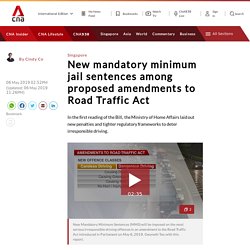
These minimum sentences will meted out to offenders who show “egregious driving behaviour” and “cause death or injuries with long-lasting impact on the victim”. The amendments will also introduce two classes of irresponsible driving offences that the MMS will be applied to: Dangerous driving and careless driving. The two categories will roughly correspond to the Rash Act and Negligent Act in the Penal Code. In effect, the MMS will be meted out to drivers charged for dangerous driving causing death and dangerous driving causing grievous hurt.
For dangerous driving causing death, first time offenders will face up to eight years in jail, with an MMS of two years. Second-time offenders on the above charge will face a two-year minimum jail sentence, with up to 10 years' imprisonment. Negative Punishment. Traffic Offences in Singapore: Demerit Points & Composition Fines (2020 Update) (Photo Credit: Singapore Police Force) Updated: 25 August 2020 Here is the full list of traffic offences that carry demerit points and composition fines in Singapore.
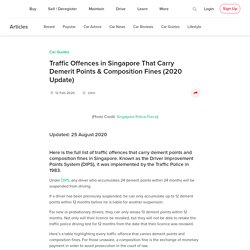
Known as the Driver Improvement Points System (DIPS), it was implemented by the Traffic Police in 1983. Under DIPS, any driver who accumulates 24 demerit points within 24 months will be suspended from driving. If a driver has been previously suspended, he can only accumulate up to 12 demerit points within 12 months before he is liable for another suspension. For new or probationary drivers, they can only amass 13 demerit points within 12 months. Here’s a table highlighting every traffic offence that carries demerit points and composition fines. Here’s the good new! Singapore Traffic Police islandwide covert operations - 34 offences detected.
25 heavy vehicle drivers get summonses in Traffic Police operation. SINGAPORE: Twenty-five heavy vehicle drivers were handed traffic summonses for range of offences in an enforcement operation across multiple locations in Singapore on Thursday (Aug 15).
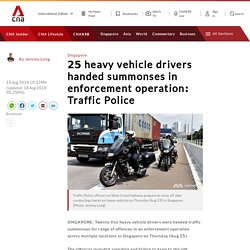
The offences included speeding and failing to keep to the left. Following two Traffic Police (TP) officers on the operation, CNA observed that other drivers were stopped for not wearing their seatbelts, or not properly displaying the speed limit sticker at the rear. “TP takes a serious view of heavy vehicle drivers who flout traffic rules as heavy vehicles are capable of causing greater damage and loss of lives when involved in accidents,” it said in a news release. It added that there were 776 accidents involving heavy vehicles in 2018, up from 765 the year before.
Twenty-six people were killed in such accidents in 2018, down from 34 the year before. Speed-tracking devices for heavy vehicles on trial until August. SINGAPORE: Three types of speed-tracking devices for heavy vehicles are currently on trial until August, the Traffic Police (TP) announced on Tuesday (May 22) at the sixth edition of the Singapore Road Safety Month.
The event, which was focused on educating heavy vehicle drivers and motorcyclists, was kicked off by Senior Parliamentary Secretary for Home Affairs and Health Amrin Amin at Republic Polytechnic. Speed limiters are currently mandated for certain heavy vehicles to curb speeding, but can be easily tampered with, TP said. The current trial aims to find a technology to complement or replace the speed limiters in heavy vehicles to effectively curb speeding. The three speed-tracking devices being trialed are the Digital Tachograph, the Enhanced Speed Limiter and the Fleet Management System.
The devices are equipped with an audio buzzer, which will be activated when the heavy vehicle driver exceeds the speed limit. Irresponsible drivers could face harsher penalties, longer driving bans - TODAYOnline. SINGAPORE — Irresponsible drivers face harsher penalties and will be kept off the roads for longer periods, if proposed amendments to the Road Traffic Act are passed.
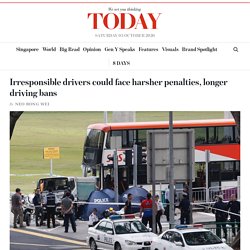
The Road Traffic (Amendment) Bill was tabled in Parliament on Monday (May 6) in a bid to deter irresponsible driving. It will be debated in Parliament in July this year. The Ministry of Home Affairs said that irresponsible driving has remained a serious concern despite efforts by the Traffic Police to improve road safety, such as through public education efforts and the introduction of new cameras. The number of summonses issued for traffic offences has increased, from 152,700 in 2015 to 181,000 in 2018, the ministry added. Road Safety Tips. A safe road journey cannot be taken for granted! Like Gracious Joseph, remember to always exercise patience and graciousness. Stay alert, drive carefully and follow traffic rules, signs, and signals. Follow these safe-driving tips and habits to enhance your experience on the roads, and make your journeys more safe and pleasant.
Never drink and drive. Never get behind the wheel when you’re tired. Maintain your vehicle regularly to minimise the chances of an accident due to mechanical failure. Always check your blind spot – avoid changing lanes at bends. Road Safety Tips for Pedestrians. As a road user group, pedestrians formed the second largest group of road traffic fatalities, behind motorcyclists and pillion riders. In most cases, the pedestrians were either crossing heedless of traffic or had failed to use available pedestrian crossing.
Following these tips will enhance pedestrian safety: ALWAYS USE PEDESTRIAN CROSSINGS like overhead bridges, zebra crossings, underpasses and traffic signal lights. RAISE A HAND WHILE CROSSING to alert motorists. USE FOOTPATHS and other walkways whenever possible DO NOT CROSS AT ROAD BENDS, as your visual field is limited in this part of the road. When a pedestrian is knocked down by an oncoming vehicle, the force from the initial impact causes the primary injury, often on the lower limbs. SAFE STEPS Road Safety: Pedestrians. SAFE STEPS Road Safety: Motorcycles. SAFE STEPS Road Safety: Distracted Driving. SAFE STEPS Road Safety: Speed Limits.